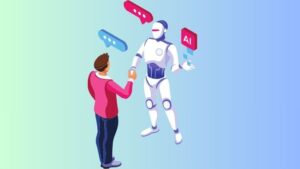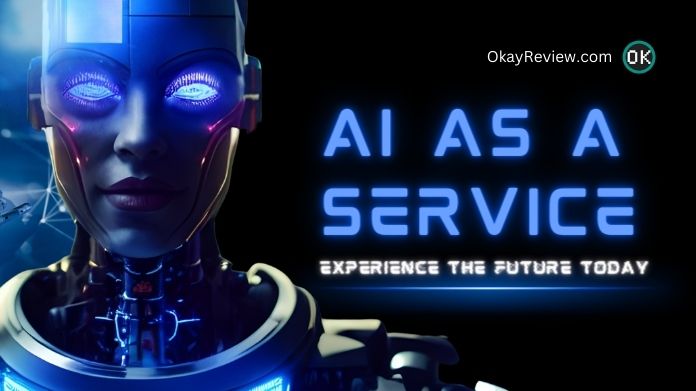In a world where technological advancements are reshaping industries at an unprecedented pace, the emergence of AI as a Service (AIaaS) is a pivotal development.
Imagine a small startup armed with innovative ideas but limited by resources suddenly gaining access to the same powerful AI tools that multinational corporations use.
Among various AI services, Chat GPT stands as a notable segment, offering unique functionalities.
This scenario is not just a possibility; it’s the reality ushered in by AIaaS. This comprehensive guide delves into the essence of AI as a Service, unraveling its layers, exploring its benefits, and examining its challenges.
We’ll navigate its real-world applications and glimpse into its promising future, providing a thorough understanding of how AIaaS democratizes artificial intelligence for all.
Table of Contents
Basics of AI as a Service
AIaaS stands for Artificial Intelligence as a Service. It’s a model where AI technology is provided as a service, enabling users to access AI capabilities through the internet.
This service model eliminates the need for users to own the physical infrastructure or possess in-depth AI expertise. Instead, they can tap into AI resources as needed, paying only for what they use.
The Components of AIaaS
AIaaS typically involves several key components:
- Cloud-Based AI Tools and APIs: These are the building blocks of AIaaS, offering users access to AI functionalities like machine learning, natural language processing, and image recognition. These solutions are accessible via APIs, allowing organizations to integrate AI into their existing systems easily.
- Data Management and Storage: AIaaS providers often include robust data management systems essential for training and running AI models. This aspect of AIaaS ensures that users have the necessary infrastructure to efficiently handle large volumes of data.
- Computational Power: AI requires significant processing power, especially for tasks like deep learning. AIaaS provides access to this computational power, allowing users to run complex AI algorithms without investing in expensive hardware.
The Appeal of AIaaS
The appeal of AI as a service lies in its accessibility and flexibility. Small and medium-sized businesses find AIaaS attractive because it allows them to experiment with AI without committing substantial resources.
They can scale their AI usage up or down based on their needs, making AIaaS a highly adaptable solution.
The Role of AIaaS in Business
In the business world, AI as a service is a game-changer. It enables companies to automate processes, gain insights from data analytics, enhance customer experiences, and innovate rapidly.
With AIaaS, AI is no longer a distant, complex technology but a practical tool businesses can use to gain a competitive edge.
The Benefits of AI as a Service
AI as a Service (AIaaS) offers a transformative approach for businesses and individuals to access and utilize artificial intelligence.
Here are the key advantages:
1. Cost-Effectiveness

AI as a Service (AIaaS) offers a cost-effective solution for businesses to access AI technologies.
It avoids the need for considerable upfront infrastructure and skill expenditures, offering a pay-as-you-go model.
This approach significantly reduces financial barriers to AI adoption, making advanced technology more accessible and cost-effective for businesses of all sizes.
2. Accessibility and Ease of Use
 AIaaS makes advanced AI technologies accessible to all businesses, regardless of their technical expertise.
AIaaS makes advanced AI technologies accessible to all businesses, regardless of their technical expertise.
With user-friendly interfaces and simplified integration processes, AI as a service ensures that any business can harness the power of AI without complex training.
3. Scalability and Flexibility
 The scalable nature of AI as a Service allows businesses to adjust their AI capabilities as needed.
The scalable nature of AI as a Service allows businesses to adjust their AI capabilities as needed.
This flexibility ensures companies can expand or reduce their AI functionalities in line with their evolving requirements, offering a tailored AI experience.
4. Continuous Improvement and Innovation

AIaaS ensures businesses always have access to the latest AI advancements.
Service providers continuously update and improve their offerings, allowing users to benefit from the newest innovations and stay ahead in a rapidly evolving tech landscape.
5. Enhanced Efficiency and Productivity
 AI as a Service streamlines operations, automates routine tasks, and provides advanced data analytics.
AI as a Service streamlines operations, automates routine tasks, and provides advanced data analytics.
This results in considerable increases in efficiency and productivity, allowing firms to concentrate on key activities that drive development.
Challenges and Considerations in AI as a Service
While AI as a Service (AIaaS) offers numerous benefits, it’s crucial to acknowledge the challenges and considerations that come with its adoption.
Understanding these factors is key to effectively leveraging AIaaS in any business environment.
1. Data Security and Privacy Concerns
One of the primary challenges of AI as a service is ensuring data security and privacy. When using AIaaS, sensitive data is often processed and stored externally, raising concerns about data breaches and unauthorized access.
Businesses must ensure that their AIaaS provider adheres to stringent data security protocols and complies with relevant privacy regulations.
2. Dependence on Service Providers
Relying on AIaaS means dependence on external service providers. This reliance can pose risks, such as potential service outages or changes in service terms.
Businesses need to assess the reliability and stability of their AIaaS providers and consider contingency plans for service interruptions.
3. Limited Customization and Control
While AIaaS offers ease of use and accessibility, it often comes with limited options for customization.
Businesses may find that off-the-shelf AI solutions must fully align with their specific needs, leading to a trade-off between convenience and tailored functionality.
4. Integration and Compatibility Issues
Integrating AIaaS solutions with existing systems can sometimes be challenging. Compatibility issues may arise, requiring additional resources for integration and configuration.
Businesses must evaluate how well AIaaS solutions can be integrated into their technological infrastructure.
5. Ethical and Responsible AI Use
As AI becomes more prevalent, ethical considerations and responsible use of AI are increasingly important.
Businesses must consider the ethical implications of AI decisions and ensure that their AIaaS solutions are used in a manner that aligns with ethical standards and societal values.
AIaaS in Action: Real-World Applications
 AI as a Service (AIaaS) is not just a theoretical concept; it’s actively transforming various industries through real-world applications.
AI as a Service (AIaaS) is not just a theoretical concept; it’s actively transforming various industries through real-world applications.
Let’s explore how AIaaS is implemented across different sectors, showcasing its versatility and impact.
1. Healthcare: Enhancing Patient Care
In healthcare, AIaaS plays a pivotal role in improving patient outcomes. AI algorithms, accessed via AIaaS, are used for diagnostic assistance, patient data analysis, and personalized treatment plans. This application of AI as a service leads to more accurate diagnoses and efficient patient care.
2. Retail: Personalizing Customer Experience
Retailers are leveraging AIaaS to offer personalized shopping experiences. AI-driven recommendations, customer behavior analysis, and inventory management are made possible through AIaaS solutions. This results in enhanced customer satisfaction and increased sales for retailers.
3. Finance: Risk Assessment and Fraud Detection
The finance sector benefits significantly from AIaaS in risk assessment and fraud detection. AI algorithms analyze transaction patterns to identify potential fraud, helping financial institutions mitigate risks. AI as a service also aids in credit scoring and personalized financial advice.
4. Manufacturing: Optimizing Operations
AIaaS is used for predictive maintenance, quality control, and supply chain optimization in manufacturing. AIaaS helps manufacturers reduce downtime, improve product quality, and streamline operations by analyzing machinery and production process data.
5. Transportation: Improving Safety and Efficiency
AIaaS revolutionizes transportation through route optimization, predictive maintenance, and autonomous vehicle technologies. These AI applications enhance safety, reduce operational costs, and improve efficiency in transportation systems.
6. Marketing: Data-Driven Strategies
Marketing professionals use AIaaS for customer segmentation, trend analysis, and campaign optimization. By analyzing vast amounts of data, AI as a service provides insights that drive effective, data-driven marketing strategies.
The Future of AI as a Service
The future of AI as a Service (AIaaS) seems bright, thanks to ongoing technology developments and rising demand across several industries.
As AI technologies evolve, AIaaS is expected to become more sophisticated, offering even more personalized and efficient solutions.
We’ll likely see a surge in AIaaS applications in healthcare, finance, and retail sectors, further streamlining operations and enhancing user experiences.
Additionally, integrating AIaaS with emerging technologies like the Internet of Things (IoT) and edge computing will offer new avenues for AIaaS capabilities and applications.
This evolution will make AIaaS an indispensable tool in businesses’ digital transformation journey, big and small.
Summing Up
AI as a Service is a game-changer, allowing businesses to leverage advanced AI, ML, and cognitive solutions without heavy investments.
As AIaaS continues to evolve, it is poised to become an integral part of the digital transformation journey for many organizations.

